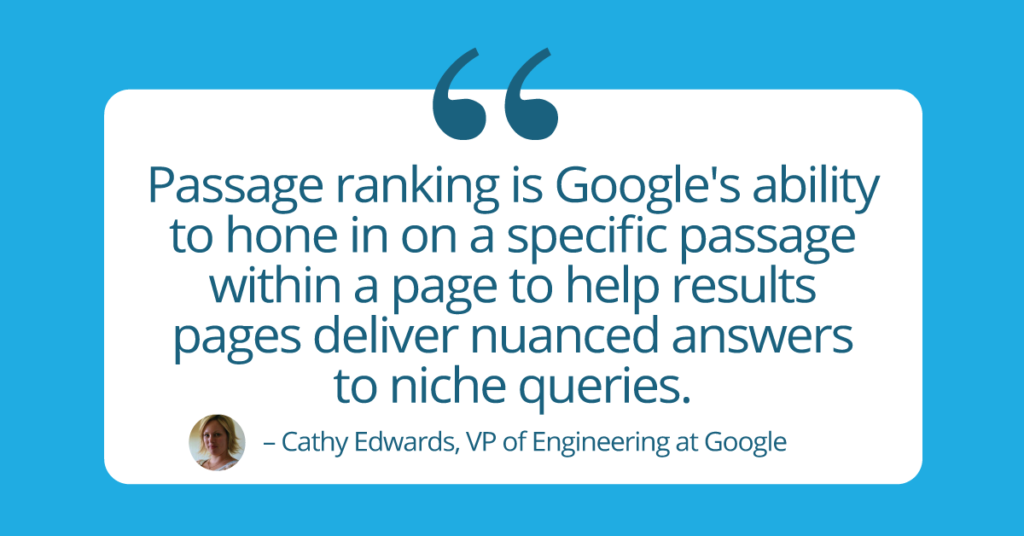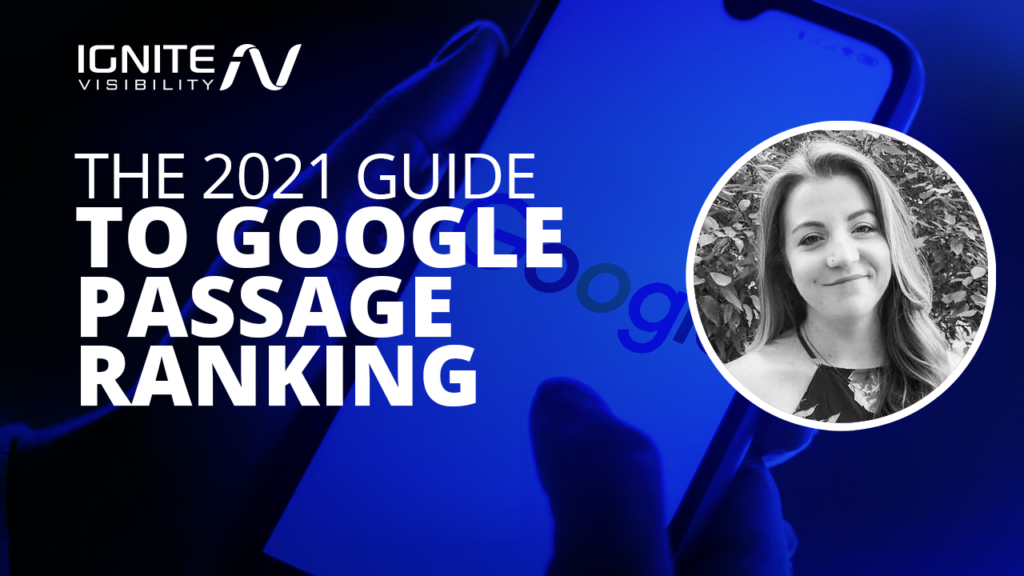What I’ll Cover:
A Rundown of the Passage Ranking Update
Google Passage Ranking vs. Google Passage Indexing
How to Shift Your Content Strategy for Passage Ranking
Passage Ranking vs. Featured Snippets
FAQs on Google Passage Ranking
SEO strategy is always changing. This was evident by Google’s passage ranking update to their search algorithm in early 2021. As a Director of Digital Strategy for Ignite Visibility, staying on top of these shifts is critical.
Passage ranking is Google’s ability to hone in on a specific passage within a page to help results pages deliver nuanced answers to niche queries.
Cathy Edwards, VP of Engineering at Google, says that this change affects seven percent of search queries. But how does it work, and how should you change your content strategy to fit?

Cathy Edwards, VP Of Engineering at Google
A Rundown of the Passage Ranking Update
Google first announced the passage ranking update in October 2020 and officially rolled out the changes in the afternoon on February 10. So far, search engine professionals like SEOs have seen little (if any) major impact on queries.
Despite the results, there are plenty of theories that this update is a continuous rollout (rather than rolling out for the entire index in one fell swoop).
What does this mean? That it could eventually impact a larger percentage of queries. We saw a similar rollout like this with the BERT update, which began rolling out as we know it in 2019.
What Is Passage Ranking?
This change doesn’t mean we’re indexing individual passages independently of pages. We’re still indexing pages and considering info about entire pages for ranking. But now we can also consider passages from pages as an additional ranking factor….
— Google SearchLiaison (@searchliaison) October 20, 2020
Google admitted that “very specific searches can be the hardest to get right.” Why? According to them, there are many instances in which the lone sentence that actually answers your question is buried deep within a web page. It may not be the key topic of the content, but it’s in there—just not at first glance.
“We’ve recently made a breakthrough in ranking and are now able to not just index web pages, but individual passages from the pages. By better understanding the relevancy of specific passages, not just the overall page, we can find that needle-in-a-haystack information you’re looking for.” – Google
For users, passage ranking is not overtly visible. You can’t actually “see” all the work the algorithm is doing to dig up a detailed answer to your question. This makes it different from a Google Chrome browser jump anchor extension, which highlights relevant sentences in yellow and alters the URL with a jump link.
Google’s statistic that this update impacts about seven percent of queries refers to US-based and English results. For this market, it will help pull out and identify specific instructions or niche answers.

Google Passage Ranking Change
There’s the example of a query on the iPhone 12 Pro Max, which is more specific than a general search for the iPhone 12. With the Google passage ranking update, a broad article on the iPhone 12 might rank well for a more nuanced search because it contains information about the iPhone 12 Pro Max.
Google Passage Ranking vs. Google Passage Indexing
Google is very clear that they don’t index parts of a page independently. That’s not surprising considering there are about a trillion web pages and it would take an enormous amount of data storage to make that happen.
Whatever the case, Google passage indexing only indexes full pages. Then, once the full page is indexed, the search engine figures out how best to use the content within the page that helps it rank.
Passage ranking has no impact on how the page is being indexed. Instead, it changes how the user views those indexed pages via the SERP. That means these passages aren’t getting unique indexing. The algorithm has improved how the indexed content looks and functions by ranking passages.
How Do You Change Your Content Strategy for Passage Ranking?
If you’re wondering how to adjust your content strategy in light of the passage ranking shift—you don’t. Not if you’re already writing good content, that is.
This update is not meant to change how people search. It’s meant to cater to how people are already searching by removing a step or two between their question and the solution.
This isn’t an algorithm update that really requires a response or a way to rank better outside of having well-written and optimized content. After all, the new content is smart enough to understand what you’re talking about within your content.
With that said, now is the perfect time to take a hard look at your content strategy. Are you creating content that answers both broad and nuanced questions? If not, now is your chance to refresh old posts and pivot for the content to come.
Title Tags & Header Tags
When it comes to Google passage indexing and ranking, you may wonder what role title tags, headers, and similar structures play.
Google used to use these as strong indicators for the context of the page, but the algorithm doesn’t need to rely on them as much as it once did.
All things considered, these are still best practices for your content. They help readers skim, get to information faster, and generally understand your content better. It’s unclear whether or not Google weighs these ranking signals in the same way users do.
The Difference Between Passage Ranking and Featured Snippets
Featured snippets have been around since about 2013 (though at the time they were called quick answers). These are different from passages that rank on the SERP.
Here’s an example of a featured snippet for the search “vegan alternative to eggs”:

Featured Snippets: “vegan alternative to eggs”
You’ll see that this shows up at the top of the SERP. Passage ranking allows content to show up throughout the search, but the meta description highlights a passage that answers the question more specifically than the broader article.
According to Google, passage ranking is a way for its systems to figure out the relevance of a web document by understanding individual passages. On the other hand, featured snippets identify “the most relevant passage in a document we’ve overall determined to be relevant to the query.”
FAQs On Google Passage Ranking and Google Passage Indexing
1. Is passage ranking part of the SMITH algorithm update?
Google announced the existence of the SMITH algorithm in early January 2021. Pretty quickly, researchers announced that SMITH outperforms BERT. This is because SMITH is better at understanding long-form content, whereas BERT only understands context within sentences.
Basically, the new version is better at looking at the whole picture rather than just the individual pixels.
SMITH does a good job at understanding and reviewing passages, which seems like a funny coincidence.
Google has yet to confirm that they’re using the new algorithm, so right now the idea that passage ranking is part of the SMITH algorithm is purely speculative.
However, based on how the Page Experience Update has rolled out (where we’ve seen Google invest more energy and resources in Core Web Vitals over time), the path looks like a familiar one. It’s not wildly out of context to presume that Google passage ranking is part of the SMITH algorithm update.
2. How should SEOs and content creators respond to the passage ranking update?
Continue writing and publishing amazing content! If you need to adjust your strategy, definitely do so. However, the point here is that the algorithm does the hard work. Make sure your posts (especially the long-form ones) are catering to both broad and specific questions.
3. Is this yet another move toward long-form content?
There’s a time and place for short-form written content, but this passage ranking update definitely caters to long-form posts. It makes them easier to sift through (perhaps so much that people might not even need to click, but we’ll have to see what happens).
4. What’s the difference between ranked passages and subtopics?
Google also rolled out subtopics to help with search in 2021. Unlike passage ranking (which helps with specific searches), subtopics help with broader searches. If someone searches something broad, the algorithm works to deliver a wider range of content. This gives the user a better chance of finding a solution without having to narrow their query.
In the case of subtopics, the only part that’s visible to people is the results—so it won’t look any different even though the algorithm has shifted.
What Passage Ranking Means for the Future of SEO
Passage ranking is more proof that Google continues to emphasize quality, well-written content.
This could lead to a potential increase in zero-click queries, similar to what we’ve seen with featured snippets. It also could mean a possible shift to the SMITH algorithm over the BERT algorithm (though there’s always the chance it will wind up as some sort of hybrid).
And we could also see an update to the Google Search Console that includes passage indexation reporting (a digital strategist can only hope!).
Need more help making sense of Google’s ever-changing algorithms? Get in touch with one of our experts!

